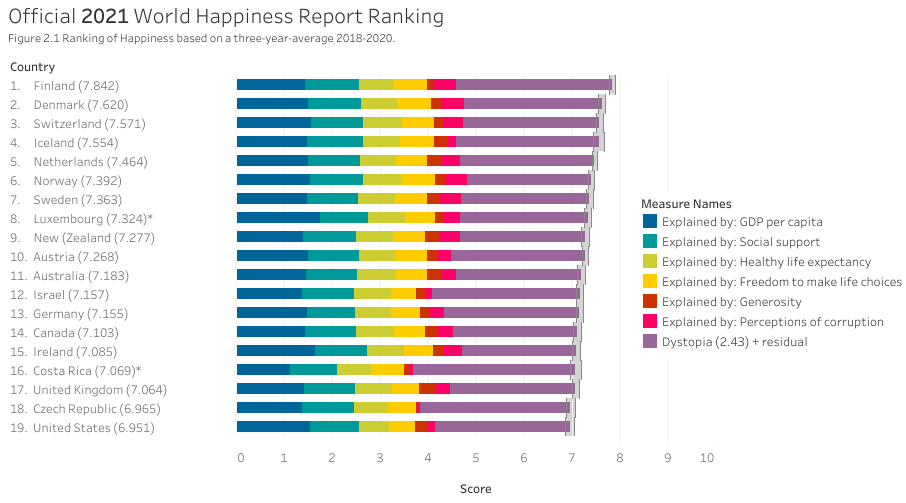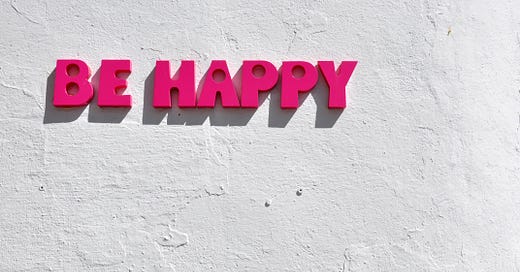Happiness is hard work. You might find it in a satisfying career, keeping your body healthy, or connecting with other people, but all of these things require effort and energy. It’s important to pay attention to how your behavior is impacting your happiness so that you can adjust your efforts accordingly. But there’s a point at which this attention can go too far and turn into an unhealthy preoccupation.
New research is studying how social pressures to feel happy impact happiness on a global scale. It’s possible that the happiest countries in the world are also the countries in which people feel most anxious to find happiness. People inevitably compare themselves to others when they judge the quality of their own lives. And if you believe that all of the people around you are happier than you are, you might feel left out or inadequate in some way. In other words, the happiest countries in the world may paradoxically make it more difficult for some people to be happy.

😊 The World Happiness Index
The chart below shows the top 19 happiest countries according to the World Happiness Report—a UN initiative that publishes a yearly world ranking of self-reported happiness. Each country’s overall score is based on a survey question in the Gallup World Poll that asks people to rate their lives from 0 (“worst possible life”) to 10 (“best possible life”). Roughly 1000 people across 149 countries complete the survey each year:

The total length of each country’s bar in the chart reflects their happiness score. Finland comes out on top while the US and UK just about make the top 20. The segments within each bar show how much of each country’s total happiness score researchers could attribute to six important variables: GDP per capita, social support, life expectancy, personal freedoms, generosity, and corruption. Population economics and supportive networks of friends and family predict a substantial portion of a country’s happiness score.
While it’s good to rank highly in the World Happiness Index, it’s possible that high average happiness comes with its own challenges. For example, could it create unrealistic expectations of happiness for people going through hard times?
🚨 The problems with demanding happiness
In a study published in February 2022, researchers surveyed 7443 people in 40 different countries on their subjective wellbeing and emotional norms. To understand wellbeing, they asked people how often they experienced positive and negative emotions and how satisfied they felt about their lives overall. To understand emotional norms, they asked everyone to rate their agreement with statements such as “People in my society view people who feel happy as more valuable” and “I think society tends to place a lot of pressure on people not to feel depressed or anxious”.
The results showed that people who felt a greater societal pressure to be happy were less satisfied with their lives, experienced fewer positive emotions, and showed more clinical indicators of stress, depression, and anxiety.
The strength of this relationship differed between countries. Although countries had similar levels of social pressure to feel happy overall, people in countries with a higher World Happiness Index rank were more affected by that social pressure. People in happier countries felt more emotionally drained by social expectations, and this was evident in both their daily emotional measures and general life satisfaction measures.
All of these results are correlational, so we have to be cautious in interpreting whether greater national happiness actually causes stronger negative reactions to social pressure.
However, there is preexisting research showing that social pressures and expectations can harm emotional wellbeing. For example, a 2012 study recruited 86 Australian participants and adjusted their social expectancies around negative emotions by asking them to read articles titled “Society Accepts Sadness in Melbourne Study” or “Society Doesn’t Accept Sadness in Melbourne Study”. By relaxing expectations around how people should feel, the first article helped to protect participants from negative emotions at the end of the experiment.
So we know that disproportionate social expectations around happiness can be harmful, and we know that the effects of those expectations appear harsher in happier countries. When happiness is more visible around us, it might make us question our own happiness more often. It’s also possible that inequalities in happiness are greater in happier countries, which means people at the bottom of the ladder compare themselves to heavily idealized standards of happiness. Or as the authors of the 2022 paper put it: “Nation-level aggregates do not reveal how happiness is distributed within a country, but a stronger imbalance in happiness would explain why unhappy individuals feel compelled to align their feelings with those of the majority group”.
Whatever the true underlying causes are, it’s clear that there are problems with painting an excessively happy picture of the world around you. If you try to keep up with impractical emotional standards, you’re doomed at the outset.
⭐️ Takeaway tips
Avoid fixating on happiness: Emotional positivity is an essential part of a healthy life, but you can overstretch it in the same way you overstretch a muscle during a workout. If healthy positivity becomes excessive positivity, you over-burden your mental health with unrealistic expectations. You can achieve happiness without constantly feeling as though you’re running after it. If you make time to enjoy your favorite activities and see the people you love each day, happiness will trickle into your life without you worrying about it. Do things that make you happy without necessarily doing things to make you happy.
Be accepting of negative emotions: Trying to push away negative emotions can be counterproductive. If you try too hard to avoid them, your attention will constantly monitor where they are, which naturally keeps them coming back into your awareness (one of my past newsletters goes into this “ironic process theory” in more detail). Instead of thrashing against the oncoming waves of negative emotion, just let yourself float up and down with them.
Don’t compare yourself to others: I’ve previously written about the dangers of social comparison, especially the danger of upward comparison bias, which refers to our tendency to compare ourselves with people who are better off. Judging our own happiness against other people’s happiness is a recipe for disaster, because we’re too hard on ourselves. We ignore how our own circumstances are unique, and other people only show us what they want us to see. Compare your current self to your past self instead of comparing yourself to other people. It’s a more effective way to understand your progress in life and your relative happiness.
💡 A final quote
“Happiness is not an end — it is only a means, and adjunct, a consequence.”
~ Dinah Craik
❤️ If you enjoyed this, please share it with a few friends. If you’re new here, sign up below or visit erman.substack.com
📬 I love to hear from readers. Reach out any time with comments or questions.
👋 Until next time,
Erman Misirlisoy, PhD



